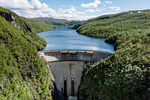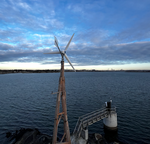News Release from DNV
Wind Industry Profile of
DNV calls upon leaders at COP26:
An urgent change of mindset and a massive redirection of spending from carbon-heavy investment into clean energy is needed if an affordable transition that meets the Paris Agreement is to be achieved, says DNV in its special report: “Financing the Energy Transition“.
- The financial markets, supported by policy and regulation, have an essential role to play in ensuring a just and accelerated transition
- Financiers face challenges in how to price the risk of often multi-decade energy projects
Emissions must fall by around half by 2030 for a 1.5ºC future – DNV forecasts they will fall by just 9%, and the world will already exhaust the 1.5ºC budget in 2029.
Financiers, bankers, and governments have an essential role in ensuring a just and accelerated transition. Yet financiers also face significant challenges, particularly around how to price the risk of often multi-decade energy projects – in a rapidly changing energy system and warming climate. This includes the potential for stranded assets, climate risk in infrastructure, and pressure on profitability and rates of return if too much capital chases a limited number of projects.
Together with policymakers and energy companies, financiers also face the challenge of de-risking and improving the profitability of clean-energy opportunities that are currently high-risk, low-return, long-term investments, which are often not considered bankable, but which are needed for an accelerated transition.
Financing the Energy Transition focuses on the opportunities and challenges for financiers, policymakers, developers, and energy companies. The new report, featuring contributions from global financial, policy and energy experts, shows there is a consensus that new, short-term actions, alongside long-term commitments, need to be agreed by global leaders at COP26 in November.
It combines DNV’s fifth Energy Transition Outlook (ETO) with views from a diverse set of leaders in the energy and finance sectors. These opinions will be discussed in more detail at a complimentary one-hour DNV event on 30 September.
Ditlev Engel, CEO, Energy Systems at DNV, who will moderate the session, said: “The world is consuming the remaining carbon budget way too fast, and the chances for reaching the goals and objectives in the Paris agreement are now in real danger. Governments and businesses need to recognize that the remaining global carbon budget needs to be used very wisely and we must place this approach at the centre of all decision-making.
“As confirmed in our ETO, we remain very technology optimistic, but the real potential of technology can only be achieved if the required policies and actions are in place on a national and international level. We can mobilize and redirect the required capital and achieve a deeply decarbonized energy system.”
DNV believes a clean energy future is affordable. In its recent ETO it forecasts that the percentage of world gross domestic product (GDP) that will be spent on energy will halve from 3.2% in 2019 to 1.6% in 2050. If the current fraction of GDP devoted to energy expenditure remained constant, the surplus funds to spend on clean energy would grow by around USD 2trn each year, reaching close to USD 63trn by 2050 – more than enough to finance a transition compliant with the Paris Agreement.
Mr Engel said: “It’s clear that we have the financial capacity to accelerate the transition, hence the question we have to put forward to COP26 is that as world leaders, we have to prioritize upfront investment and ensure governments don’t just deal in long-term climate commitments, but also in short-term climate action. Targets must be grounded with a credible baseline for emissions, translated into action every year for at least the next 30 years.”
DNV’s research emphasises that financing a just and equitable transition will be important for a successful transition. For governments, enabling a just transition is a prerequisite for achieving policy targets as transition initiatives will fail without sustained support from many voters.
For the finance community, the capacity of companies to achieve a just transition – both environmental and social – is increasingly among the criteria considered by investors.
- Source:
- DNV
- Author:
- Press Office
- Link:
- www.dnv.com/...
- Keywords:
- DNV, COP26, Paris Agreement, leaders, mindset, investment, redirection, energy transition, report, finances, projects, capital
























